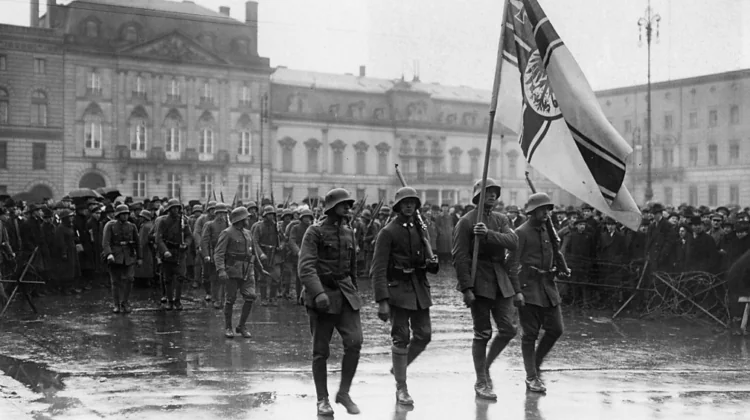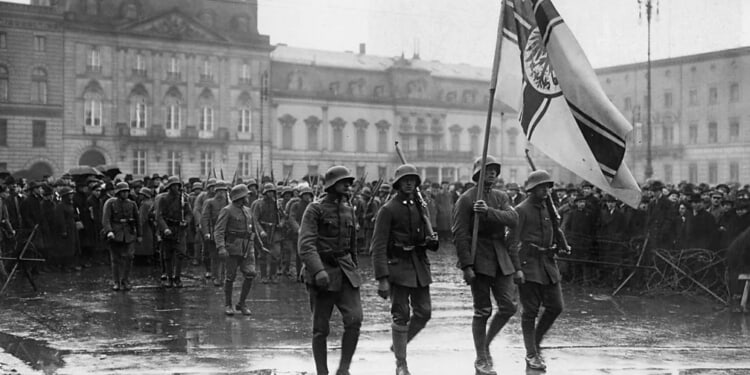
[Order Michael Finch’s new book, A Time to Stand: HERE. Prof. Jason Hill calls it “an aesthetic and political tour de force.”]
I first read William Shirer’s monumental The Rise and Fall of the Third Reich (1960) in my teens. I remember the experience vividly, because I was mesmerized. In the paperback edition that I read – and that, fifty-something years later, its pages yellowed and its cover missing, is lying next to my laptop as I write this – the main text was nearly 1500 pages long, and I remember reading every word of it, my interest never flagging. Shirer, a top American journalist who had been a Berlin correspondent during the early days of the Third Reich, was a terrifically engaging writer, and he managed to turn an impossibly complicated story into a straightforward narrative with the forward propulsion of the torpedoes that sank the Bismarck.
How unfortunate, then, that in Fateful Hours: The Collapse of the Weimar Republic – which librarians will shelve not far away from Shirer’s book, although the period it covers is narrower – the German historian Volker Ullrich manages to make the same material as heavy going, for the most part, as a forced retreat through the knee-deep snows of a Russian winter.
Despite its title, Fateful Hours isn’t just about the Weimar Republic’s implosion in 1933, when Hitler consolidated his power, but also about its formation in 1918 from the postwar ruins of the German Empire – plus everything in between. This being the case, I’d hoped the book would include some vivid word pictures of life in 1920s Germany – you know, the kind of content that made Cabaret so gripping. And yes, eventually Ullrich serves up a bit of that sort of thing. But before taking us outside to see what ordinary people’s lives were like during those weird and difficult years, he keeps us cooped up indoors for nearly 100 pages with a throng of windy politicians, witnessing in detail the multitudinous machinations, the elaborate planning and secret plotting and power moves, the making and violation of promises, the forming and breaking of coalitions, and the adoption and abandonment of innumerable policies, that were involved in the rocky transformation of Kaiser Wilhelm’s reich into the Weimar Republic – and that no reader this side of Dustin Hoffman’s character in Rain Man could possibly keep straight for two minutes.
True, the opening act of Weimar also includes a few colorful assassinations – including those of the Communist activist Rosa Luxemburg, who after a revolutionary uprising was arrested, shot in the head, and dumped in a canal, and Foreign Minister Walther Rathenau, who was submachine-gunned to death at point-blank range. Ullrich quotes linguistics professor Victor Klemperer as saying (in I Shall Bear Witness, another book that’s a lot more absorbing than this one) that the killing of Rathenau had pushed him “far to the left”; the same murder led Thomas Mann, too, to shift his political position, as reflected by a famous speech of his that ended with the words: “Long live the republic!”
Alas, Mann’s wish was not to be granted. The republic would have a short life – and a frenetic one, crowded with events that Ulllrich characterizes as turning points:
- “Hindenburg’s election to the Reich presidency [on April 26, 1925] was undoubtedly a turning point in the history of the Weimar Republic.”
- “The breakup of the grand coalition on March 27, 1930, was undoubtedly a major turning point in the history of the Weimar Republic.”
- “In the Vossische Zeitung, historian Veit Valentin spoke of a ‘turning point in contemporary history’ [after Hitler lost the presidential election on March 13, 1932].”
- “The fall of the Brüning cabinet [on June 1, 1932] was indeed a turning point.”
- “In the highbrow Social Democratic journal Die Gesellschaft, former Finance Minister Rudolf Hilferding named August 13 [of 1932] – the day on which Hindenburg refused to appoint Hitler as Reich chancellor – as the ‘decisive turning point.’”
- “Like Sieveking, many Germans did not initially perceive January 30, 1933 [when Hitler was proclaimed chancellor], as a dramatic turning point.”
Unfortunately, Ullrich’s exceedingly meticulous account of the political highlights and lowlights, the rises and falls, the comings and goings of the Weimar years soon gets to be more than a tad numbing. He doesn’t just recount in detail the succession of one chancellor by another; he provides us complete lists of cabinet members, including the ministers of food and the postal service, most of whom would serve only the briefest terms. And he devotes long eyes-glaze-over passages to such stupefying subjects as the January 1932 mobilization of the Reich Rural League, “the powerful lobbying organization of the large East Prussian estate owners,” against the government of Kurt von Schleicher, “which it accused of not doing enough to protect agriculture against cheap food imports and foreclosures on bankrupt farms.”
To be sure, one of the political figures about whom Ullrich writes is never dull. That would, of course, be a certain Herr Hitler, of whom Ullrich records a couple of interesting glimpses: when Wilhelm Groener, interior minister (1931-32), met the future Führer, he concluded that he was a “modest, orderly man who wants the best” (well, nobody gets everything right); after Thomas Mann’s son Klaus noticed Hitler and some of his cronies at a café in Munich, Mann described him in his diary as “[a] man of positively conspicuous inferiority…the greatest embarrassment in history.”
In Fateful Hours, as in other books and movies about the Nazis, it’s gruesomely fascinating to follow their relentless rise. Many would describe it as not only relentless but inevitable; Ullrich disagrees, believing that there were several points at which Hitler & co. might have been stopped – or self-destructed. Indeed, it’s easy to forget how many times the Nazis were widely thought to have passed their peak – among them the meeting of August 13, 1932, at which Hindenburg rejected Hitler’s demand for the chancellorship (an event that led one observer to compare Hitler to Icarus) and the Thuringian elections on December 4, 1932, in which the Nazis lost big (about which the British Labour Party’s Harold Laski predicted that Hitler would end up as “an old man in a Bavarian village, spending his evenings in the Biergarten telling his cronies how he once almost overthrew the German Reich” – another bad call).
Also compelling is Ullrich’s account of the hyperinflation that peaked in 1923. Again he quotes Klemperer: one day in August of that year, the latter’s wife ordered a coffee, the posted price of which was 6,000 marks; by the time she went to pay, it had doubled. By early November, notes Ullrich, “hyperinflation reached its surreal peak,” leading one woman to write her parents: “One billion is now our smallest currency unit—as of Monday [it will be] the price of a domestic postage stamp.” On this topic, Ullrich also quotes the authors Stefan Zweig, who would later opine that the hyperinflation had made Germans “furious with hate and…ripe for Hitler”; Sebastian Haffner, who wrote in 1939 that 1923 had “prepared Germany, not specifically for Nazism, but for any fantastic adventure”; and Thomas Mann, who declared from his California exile in 1942: “There is a straight path from the madness of German inflation to the madness of the Third Reich.”
Indeed. Hyperinflation, pronounces Ullrich, caused honest citizens to
pilfer from greengrocers and bakeries to survive. Others traveled to the country with rucksacks to hoard food. In lieu of increasingly worthless paper marks, farmers demanded to be paid in material items—jewelry, paintings, carpets, and porcelain. Those who had no commodities of the sort to offer tried to steal what they needed from fields. Traditional bourgeois notions of property dissolved along with traditional moral standards. Crime increased in inverse proportion to devaluation of the mark. In the hurricane of hyperinflation, it was everyone for themselves.
The result was an atmosphere in which “values such as reputability, decency, and civic responsibility no longer counted for much.”
Even as Germans suffered, however, foreigners – like the British author Christopher Isherwood and his fictional creation Sally Bowles – thrived; their American dollars and pounds sterling, whose value relative to German currency just kept soaring, enabled them to “populat[e] houses of entertainment, resid[e] as pampered guests in fancy hotels, and acquir[e] treasures at bargain prices in antique stores and at art auctions.”
It couldn’t last for long. And it didn’t. Soon enough the foreigners would scurry back home. Some of them, in the fullness of time, would return to Germany in uniform.
What to say about this book? I’d hoped it would be at least a bit reminiscent of Isherwood’s evocative, richly human Goodbye to Berlin; instead, at its most stultifying, it makes even the most tedious German philosophers look like beach reading. Let’s just say that Ullrich doesn’t exactly have a light touch. This is, not to put too fine a point on it, popular German history writing at its most German.
There’s something else that needs to be said about Ullrich: he’s no fan of Donald Trump, whom he considers a threat to the democratic order. “The future of American democracy,” he contends in his preface, “has never been so uncertain since the declaration of independence.” Similarly, he’s unenthused by Germany’s Alternative for Germany, or AfD – which happens to be that country’s only hope for salvation from Islam, but which, in Ullrich’s view, is also a menace to democracy.
By making these assertions in the preface to a book about the collapse of the Weimar Republic, Ullrich – who is no callow youth (he’s 82) – seems to be implying what many establishment types on both sides of the pond have stated explicitly: that Trump is the new Hitler. Obscene. Granted, in a 2020 interview with the Times of Israel he answered a question about Trump by saying that it’s not “appropriate to compare the two” – but he preceded this statement by, ahem, comparing the two:
Trump and Hitler do certainly share a number of traits, including a narcissistic personality structure, a tenuous relationship to the truth, resentment for elites, the pretense of wanting to restore past greatest to the home country, a habit of firing subordinates who don’t toe the line and the ability to use new media to advance personal ends.
This wasn’t the first time Ullrich had linked the Führer with the Donald. Talking with the Globe and Mail in 2017, he denied that “comparisons between Hitler and Trump are very useful,” then listed their purported commonalities: “the egomania, the inclination to mix lies and truth, the promise to restore their own nation to the old greatness, resentment against the elites and so on.” He also parroted the Charlottesville calumny – “good people on both sides” – which means that he was either outright lying or was ignorant about what Trump actually said there.
To be sure, if people like Ullrich view Trump as a threat to democracy it’s largely because he, like Hitler, was a political outsider who rose to power through the ballot box; for them, perversely, democracy means the distinctly undemocratic type of governing system that obtains in the European Union, where leaders rise to power not through popular election but through the same kind of institutional-insider route that obtained in the Soviet Union. By this twisted logic, Ursula von der Leyen counts as a democratic leader, while Trump is that suspicious commodity, a “populist” – populism being a scare word for real democracy, that fishy commodity that the notorious populist Abraham Lincoln dubbed “government of the people, by the people, and for the people.”
Oh, well. It’s beyond disturbing, needless to say, that an apparently distinguished historian like Ullrich – whose oeuvre includes well-received biographies of Napoleon and Bismarck, several books on the Nazis, and a two-volume life of Hitler (the first half of which was hailed by the Guardian as “outstanding”) – can have such a cockeyed take on Trump. But then, even veteran historical scholars can be a lot better at reconstructing the past than at understanding the present. In such cases, perhaps they should refrain from offering comments that, in the future, will make them look like unmitigated fools.

















